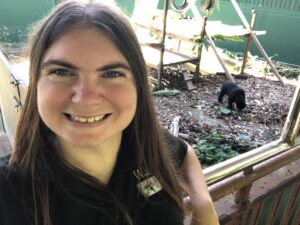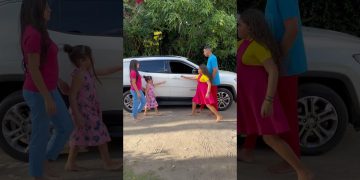
Sarah with Bears at Lok Kawi Wildlife Park, Sabah.
After a 30 hour journey into the heart of Sabah, Borneo, the team at internationally renowned charity, Wild Welfare linked up with staff from Lok Kawi Wildlife Park to continue work to help positively impact the lives of their animals. During their latest visit, Director Simon Marsh and Animal Welfare Field Manager, Sarah Bonser-Blake closely collaborated with the park’s management and care teams to improve facilities, care practices, and strengthen their understanding of animal welfare principles to guide the implementation of sustainable improvements.
Sarah, who last visited the park two years ago, was pleased to see the dedicated changes which had already been implemented. “I’ve loved watching the bears use their new furniture, and the new aviaries are a huge improvement for the parrots and hornbills, giving them more space and opportunities to explore. It’s heartening to chat with the keepers and witness their own enthusiasm for the changes that have been made and the plans they have for the future. It’s exciting to be on this journey in partnership with them.” Sarah enthusiastically affirmed.

Sarah presenting to the Lok Kawi Wildlife Park team.
The Wild Welfare team hosted a talk and workshop which addressed 30 attendees, whereby Sarah explored the vital differences between welfare and animal care. The workshop engaged each of the teams in creating an enrichment rota for one of their key animal species. The focus was to ensure that all forms of environmental and behavioural enrichment were carefully considered, including the physical, sensory, and dietary needs of the animals. This exercise not only reaffirmed the importance of purposeful enrichment, but also gave keepers a good understanding of how a structured strategy can achieve particular outcomes that benefit animals and caregivers alike.

Eclectus Parrot, Hijau, perched on branch.
The visit also gave the Wild Welfare team a wonderful opportunity to see how specific animals are already benefiting from enhanced care across the park. Back in 2023, Hijau the Eclectus Parrot was displaying signs of learned helplessness and distress, while rarely leaving the floor of his enclosure. We worked with his care team to introduce him into a newly refurbished aviary, where he quickly showed signs of improvement. Hijau is now much healthier and happier in the larger modified birdhouse with plenty of perching opportunities. He no longer lives on the ground and can now freely explore his new home. As part of a new bird feeding and enrichment programme, leafy bamboo branches and new kebab feeders were also introduced to encourage natural avian activities such as manipulation of food items with their feet, and the shredding of novel objects with their beaks. Rosie, a confident green-winged macaw, promptly went on to investigate and play with the new items, demonstrating that even simple but considered enrichment can help to provide new ways for animals to express natural and motivated behaviours.

Building kebab bird feeders with the Lok Kawi Wildlife Park team.
The Wild Welfare team spent considerable time with the sun bear caregivers to help them implement welfare-oriented methods of care for the numerous bears in their current home. Keepers were introduced to newly improved daily husbandry routines, enrichment plans and modified food delivery methods aimed at promoting the animals’ natural feeding tendencies. Bananas were smeared around parts of the enclosure to encourage the use of their extraordinarily long tongues, and food was hidden under logs and leaf piles for them to find using their dextrous claws. Diego the Bornean Sun Bear, along with the other bears at Lok Kawi have been enjoying these positive changes, which now allow them more foraging opportunities within their enclosures. On a particularly hot day during the team’s visit, Diego was seen excitedly playing with bunches of leaves and splashing in his pool like a young cub, despite his older age.

Sun Bear, Diego, taking a dip.
“It is important that the staff understand the benefits of incorporating daily enrichment into the animals lives, why the animals need to engage in certain activities, and how this not only promotes natural behaviours, but reduces negative or abnormal behaviours. We also emphasise during our training that it is not about creating more work for the staff, just using the time they have more constructively. Instead of feeding the same way every day, the staff now know they can change the way they feed the animals without it taking any more time, so it is a win-win situation for the animals and the staff” Simon added.
In order to encourage the park staff to continue these important activities, Wild Welfare provided a set of Enrichment Road Maps in both English and Malay. These enrichment roadmaps are a great planning tool created by Wild Enrichment in collaboration with Wild Welfare, to guide users through the entire process of developing and assessing enrichment for animals in human care.

Simon taking a look at a Cassowary
“We are so pleased with the progress made at Lok Kawi Wildlife Park during our partnership. Whether we are supporting Lok Kawi virtually or in-person during our visits, the whole team embraces the information and training we provide and we are now seeing the results. This progress has been enthusiastically supported by the team at Borneo Behaviour Solutions (BBS), who work alongside the animal care staff and Wild Welfare.” Simon concluded.
Reflecting on the ongoing improvements, Maryati A. Lakim, Curator of Lok Kawi Wildlife Park, noted how “Witnessing the positive changes in our animals through the support of Wild Welfare has been truly heartening. We look forward to continuing this collaboration, paving the way for even greater improvements in animal welfare and inspiring our animal care team to elevate their daily husbandry practices.”

Blue and gold macaw at Lok Kawi Wildlife Park.
This ongoing collaboration between Wild Welfare and Lok Kawi Wildlife Park is supported by a shared passion for animal welfare. Wild Welfare wishes to thank donors for their invaluable support, particularly Hertfordshire Zoo, The Big Cat Sanctuary and Marjorie Coote Animal Charity Trust, without whom this worthy project would not have been possible. A great deal of progress has been made thus far, but still so much more can be achieved, and Wild Welfare is dedicated to supporting Lok Kawi Wildlife Park and many other global facilities every step of the way, creating a world where every captive wild animal is able to thrive and live a good life. To help Wild Welfare continue this important work, please consider getting involved and make a donation online today at WildWelfare.org.
ENDS
Wild Welfare is devoted to improving the welfare of captive animals across the world. You can support our efforts by sharing this article, signing up to our newsletter, following our social media accounts (Facebook and Instagram), or by making an online donation. Every small contribution can help us to develop our vital accessible animal resources. Thank you.
Notes to Editors
For more information or interview requests please contact Wild Welfare on communications@wildwelfare.org
Wild Welfare is a global organisation committed to improving animal welfare for captive wild animals. By uniting the world’s leading zoos, zoo associations and animal welfare organisations, we build trusting partnerships that help provide long-term solutions to critical wild animal welfare issues.
Our vision is to end the suffering of captive wild animals around the world and ensure full and sustainable protection is given to all animals in human care. Find out more at wildwelfare.org. Registered charity in England (no.1165941).









Discussion about this post